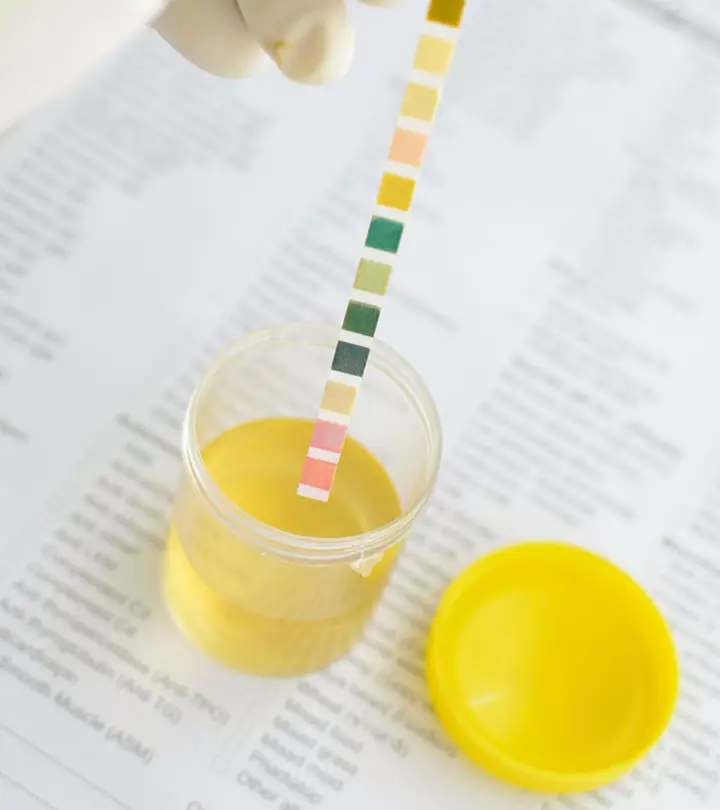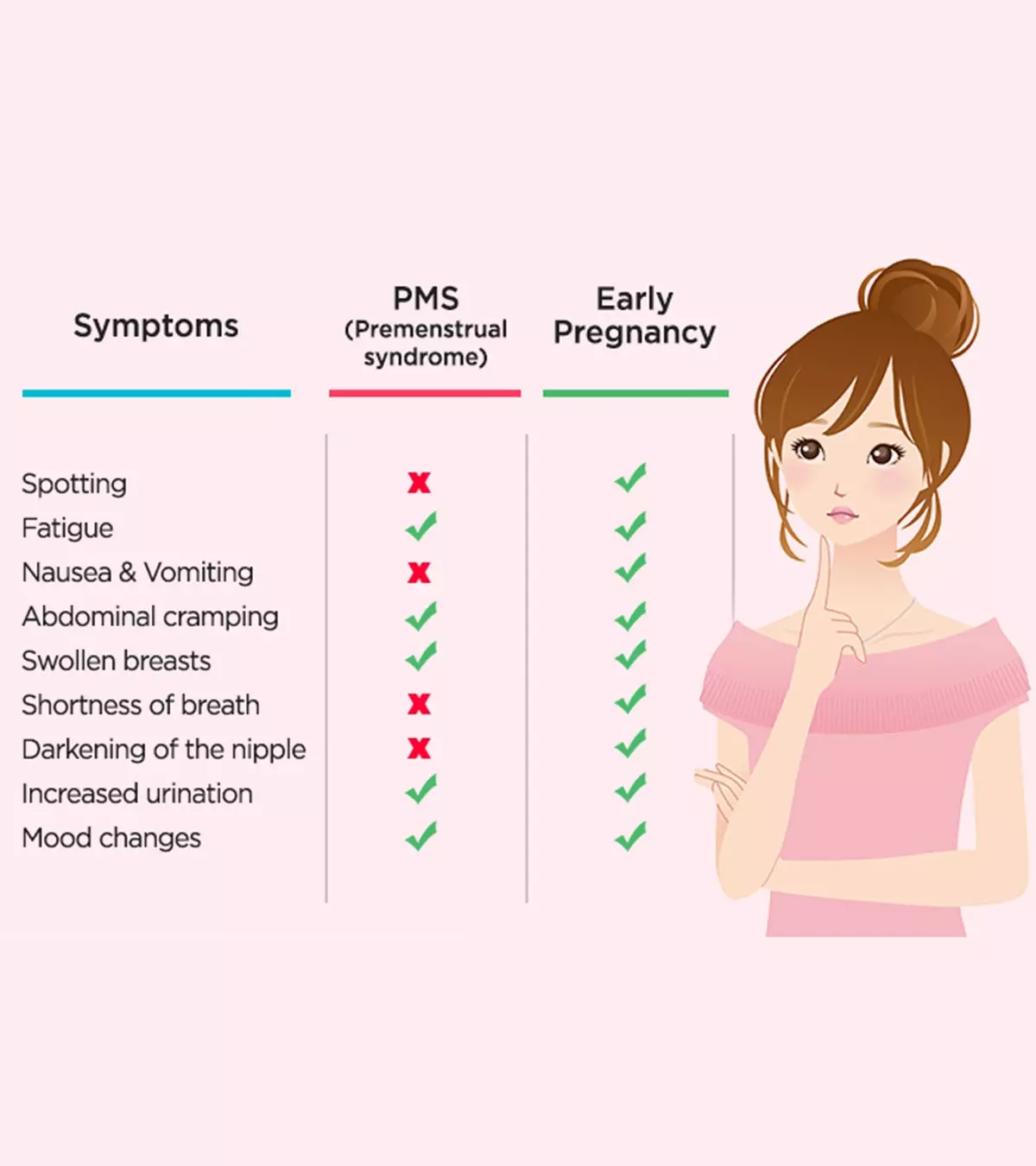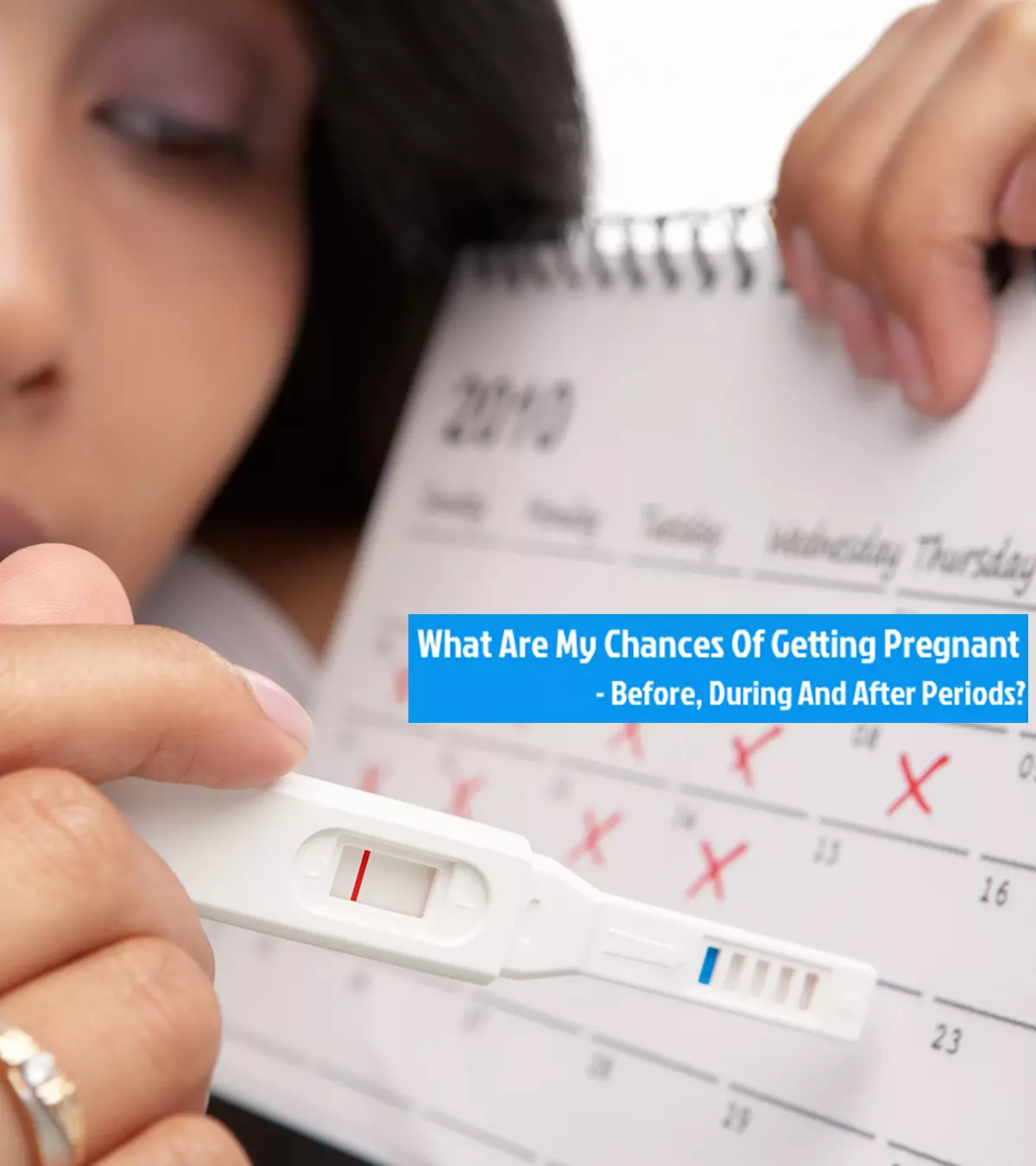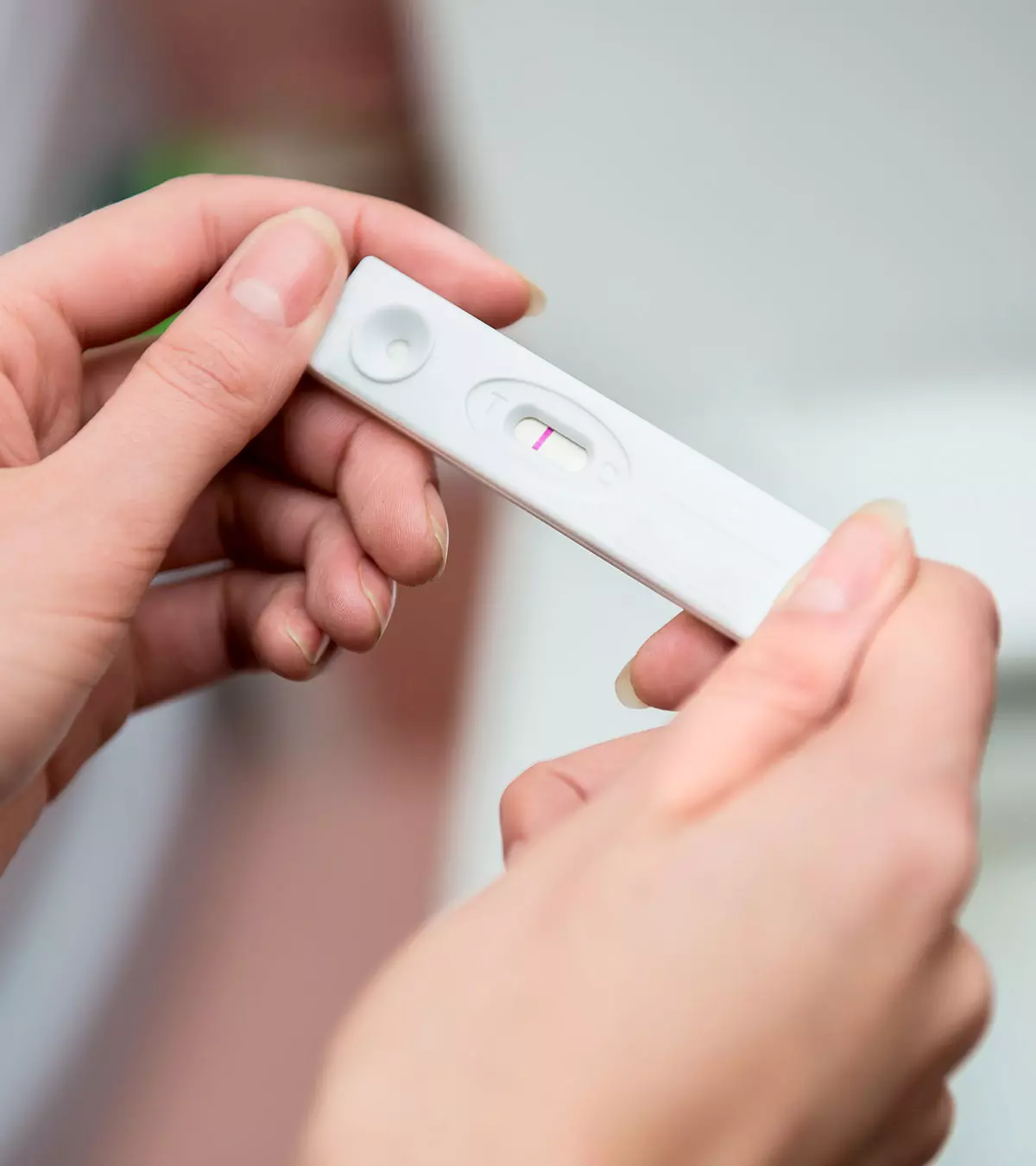
Image: ShutterStock
In instances where you find a faint line on a pregnancy test done at home, you might be unsure whether you are pregnant or not. Normally, two pink lines in the test indicate pregnancy, while one indicates its absence. Understanding the faint line on a pregnancy test can alleviate anxiety and guide your next steps. It is essential to interpret the results correctly to make informed decisions about your health and pregnancy journey. The appearance of a faint line during the test becomes confusing, but there may be several reasons for it to appear. It may indicate pregnancy or even miscarriage. However, you don’t need to worry about it before taking the test again after a few days. If the results remain the same, you might consider talking to a healthcare provider. Read the post to understand the details about home pregnancy tests, the steps to perform the test, and the reasons behind the appearance of a light pink line in the pregnancy kit.

Key Pointers
- Two lines on a pregnancy test indicate a positive result, while one line indicates the absence of pregnancy. A faint line may cause confusion and could mean pregnancy or even miscarriage.
- Pregnancy tests work by detecting the hCG hormone which is produced by the body when the fertilized egg implants in the uterine wall.
- The two basic types of pregnancy tests are blood and urine tests. The latter is usually taken at home.
- In case of a faint line or negative pregnancy test, wait for a week and repeat the test.
- It is best to take the pregnancy test in the morning while the urine is still concentrated, and the presence of hCG is still high.
- A faint line on the pregnancy test usually indicates a low count of hCG hormone in your urine stream. It could also appear because instructions were not followed correctly. Testing too early into your pregnancy could also cause a faint line to appear. Diluted urine is also a factor.
- Pregnancy tests vary in sensitivity which could also be the reason behind the faint lines. Using an expired kit could also lead to faint lines on your test. The intake of some medications may also cause problems while testing for pregnancy.
How A Pregnancy Test Kit Works
The National Health Service (NHS) recommends that you take a pregnancy test at least 21 days after you had an unprotected sexual activity and missed your period (1). Home pregnancy test kits are about 99% effective if used correctly (2). Let us check out, some informative facts about pregnancy tests and how does it work (2):
- Pregnancy tests work by detecting a special hormone in your blood or urine. The typical hormone is hCG human chorionic gonadotropin. Your body produces the hCG hormone when the implantation of the fertilized egg in the uterine wall occurs.
- The two basic types of pregnancy tests recommended are blood and urine (home test). Compared to qualitative blood or urine tests, the quantitative blood test can diagnose early pregnancy with greater accuracy and speed.
Ann M. Gronowski, PhD, MS, a professor of pathology and immunology, and of obstetrics and gynecology at the Washington University School of Medicine emphasizes, “The best test to detect pregnancy is a blood test. If there’s any doubt, I would recommend women talk to their physicians and request blood tests (3).” - Most of the home pregnancy tests analyze your urine sample and detect the presence of hCG in your urine stream. After a few minutes when a line appears on the indicating panel, it clearly indicates about positive pregnancy.
- In case of early pregnancy, if the line appears faint you can take the test after a few weeks again.
- Home pregnancy tests are more or less accurate. Some of the pregnancy test kits appear more sensitive than others. It is suggested that dip urine pregnancy testsiThis home pregnancy test requires women to collect the urine in a cup and dip the absorbent pad in the urine for at least 10 seconds. have about 70% accuracy while the midstream pee stick urine pregnancy testsiThis pregnancy test requires women to pee on the absorbent area of the stick directly for 3-5 seconds. have an accuracy of about 99% (4).
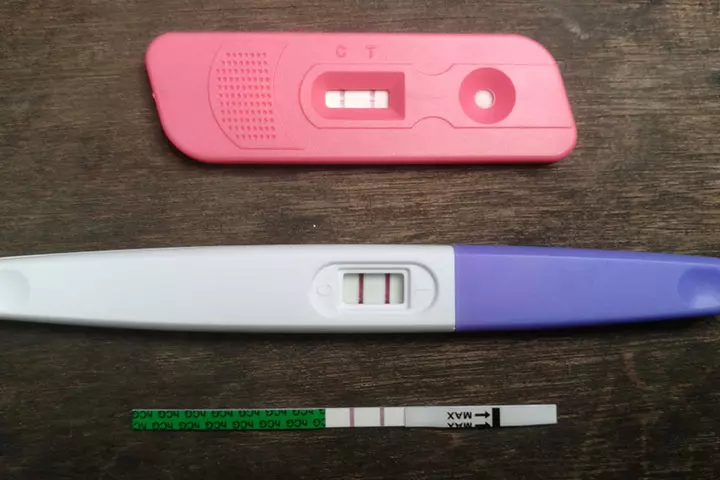
- Sensitive home pregnancy test detects positive pregnancy even on the first day of missed period.
- Sometimes the pregnancy test shows negative results even if you are pregnant. In such a scenario, wait for another week and repeat the test. Intake of medications or alcohol interferes with the test and imposes a negative result. It’s not uncommon to have pregnancy symptoms but negative test results, especially early in pregnancy.
- Read the test instructions carefully before using the home pregnancy test kit all by yourself.
- The best time to take the pregnancy test is during the early morning. During the morning, the urine remains concentrated, and the presence of hCG is typically high.
- Testing too early after your missing period leads to false negative tests. According to a research conducted at the Washington University School of Medicine in St. Louis, the reports from the past decade suggest that about 5% of pregnant women received false pregnancy results during early weeks of pregnancy (3).
- All home pregnancy tests contain the display box showing a color line to indicate whether the test is working or not. A second color line appears when the test indicates the presence of the hCG hormone in urine. Even if a faint line appears, it is still considered a positive sign. It is suggested to retake the test within two to three days after consulting your gynecologist because a faint line might also suggest an ectopic pregnancy.
- If your pregnancy test shows positive results, book an appointment with the gynecologist and get the requisite advice (5).
 Point to consider
Point to considerThe presented graph depicts the changes in blood hCG levels throughout pregnancy. According to the illustration, the blood hCG levels experience a significant increase during the initial 12 weeks or the first trimester, followed by a relatively stable phase between weeks 13 and 24. Afterward, the blood hCG levels gradually decline.

Blood hCG levels throughout pregnancy
Source: β-HCG Level as a Predictive Marker of Pregnancy Progression or Retrogression; Open Journal of Obstetrics and GynecologyWhy Take A Home Pregnancy Test
Home pregnancy tests are easy-to-use tests that can help you know your pregnancy status at home. If you’re on fertility treatments or trying to conceive, these tests can offer a convenient way. There are numerous other benefits of taking a home pregnancy test, which may include (6):
- The pregnancy test kit checks the hormone hCG level in your urine and enables you to know about the status of your pregnancy in advance.
- When you plan to conceive, it is not possible to rush every time to the doctor for detection of pregnancy status. Using the home pregnancy test kit makes it very simple to test the presence of hormone levels in your urine.
- Pregnancy tests at home allow women to quickly and privately determine if they might be pregnant without the need for a medical appointment.
- The best time to take the pregnancy test is during the first pee in the morning when your hormone concentration is highest.
- The best feature of the pregnancy test is the immediacy of the results. The kit displays the result in less than three minutes.
Steps To Take A Home Pregnancy Test
All pregnancy tests are pretty much the same, and the only thing that differs from brand to brand is the sensitivity of the test kit. Let us check the detailed steps to conduct a home pregnancy test (7):
- The home pregnancy test kit is available in two designs. In the first types, the kit consists of the strip while the other contains a urine container.
- Always ensure a clean and dry environment when conducting the test to avoid any contamination that could interfere with the results.
- You have to pass your urination on the strip directly or hold the tip of the strip dipped into the urine container.
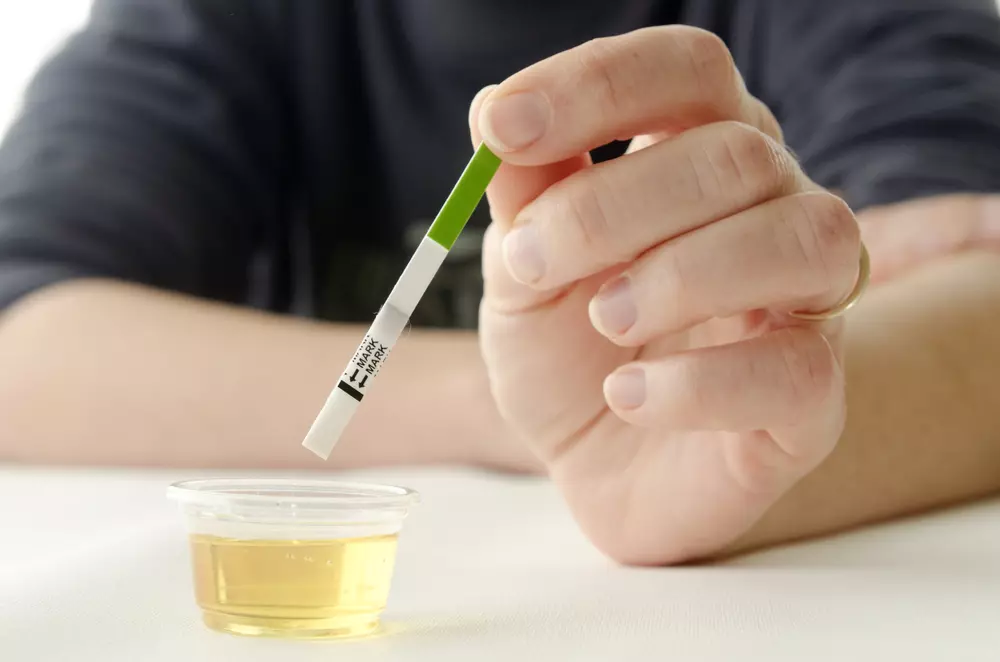
- Wait for a few minutes as indicated on the manufacturer’s instruction leaflet and then read the results.
- The amount of time you wait for the result solely depends upon the instructions provided with the test kit.
- If two bold lines appear on the display panel, it clearly indicates a positive result. But If the second line on the display panel appears faint, it indicates an indeterminate result, and it is recommended to conduct the test again after a few days to confirm the results (7).
 Quick tip
Quick tipUnderstanding Faint Line On A Pregnancy Test
A faint line in the pregnancy kit indicates the low count of the hormone (hCG) in your urine stream. Due to less or sometimes extremely high (as in an ectopic pregnancy) concentration of the hCG hormone, the line appears faint and not clearly visible. The special hormone hCG is usually present in your urine when the fertilized egg attaches to the uterus. But during early pregnancy, the hormone level is low, and the home pregnancy test kit cannot detect the presence of the hormone in your urine. Hence, you can see a faint line on the pregnancy test. (7).
Reasons For A Faint Line On Pregnancy Test
There are multiple reasons for which the home pregnancy tests show faint lines instead of the bold ones. Here we discuss some of the common reasons for which you might see a faint pregnancy line:
Failure To Follow The Instructions Vividly
- When you fail to follow the instructions mentioned on the pregnancy test kit properly, the test happens to show inaccurate results.
- If you do not allow adequate time for the test result and read the results too early, you can see faint lines. It is very important to devote the allotted time and then check the results on the display box.
- Reading the test results before or after the time slot leaves evaporation lines, and they appear faint and pale in color.
Testing Too Early
- Detection of a pregnancy test in the extreme early phase of conception is one of the most common reasons to see faint lines.
- Home pregnancy test detects the levels of the hCG hormone in your urine stream and then signifies the results. During the first week of pregnancy, the level of hCG hormone is extremely low and undetectable. As the test kit diagnoses a small percentage of the hCG hormone, the line appears faint.
- It is better to conduct the pregnancy test not earlier than ten days after ovulation or one week after having your missed period. During this period, the home pregnancy test kit easily detects the hormone and shows accurate results.
Amber, a mother of three, reflects on her experience of encountering a faint line on her pregnancy test. Her eagerness got the best of her as she tested prematurely. She admits, “I was about four days before my missed period.. but took one anyway because I’m OCD and cant wait for ANYthing. The lightest, most faint line showed after 4 minutes. I confess to taking a test about every day for the next two weeks..and then 2-3 times/week after that. I swear I’m not crazy I just was severely anxious about it all (i).”
Miscalculating Your Expected Period

- You may miscalculate your period days and conduct the test on inappropriate days. It often leads to faint lines on a pregnancy test.
- It is better to keep a note of both basal body temperature BBT charting and your menstrual cycle. It becomes easier to remember the important dates and eradicate all confusions.
 Quick tip
Quick tipDiluted Urine
- Although you can use the home pregnancy test at any point of time, it is advisable to perform the test during early mornings. The concentration of hCG hormone remains higher during this period, and the test easily detects the presence of the hormone in your urine.
Dr. Eric Flisser, a board-certified obstetrician & gynecologist based in New York, says “Since the pregnancy hormone is secreted into the urine after passing through the kidneys, it accumulates in the bladder. Overnight, the urine tends to be more concentrated than during the day, making it better suited for testing. However, it is not necessary to use overnight urine for accurate test results.”
- If you conduct the test some other time, the urine remains in a diluted condition and contains less percentage of hCG hormone. The test kit hardly detects the presence of the hormone and the line appears faint.
Pregnancy Test Sensitivity
- Some of the pregnancy test kits appear more sensitive than others.
- Some of the home pregnancy test kits detect the status of pregnancy with the hCG level as low as 20 mIU (8).
- Other pregnancy test kits require the hCG hormone level of more than 100 mIU to detect pregnancy (8).
- Hence, sensitive pregnancy test kits show bolder lines, whereas the lesser sensitive ones end up showing faint lines.
- Very high hCG concentration, as in an ectopic pregnancy, might confuse you with a faint line on the pregnancy kit accompanied by abdominal pain and spotting symptoms.
Expired Pregnancy Test

- Always check the expiration date mentioned on the pregnancy test kit and the storage instructions.
- If you store the pregnancy test kit inappropriately or use an expired test kit, you can get negative results and test works inaccurately.
Evaporation Lines
- When your urine evaporates from the pregnancy test, the line appears faint and not clearly visible.
- The faint line appears in the place, where the positive result normally appears, to indicate positive pregnancy status.
- Evaporation lines on a pregnancy test are not clearly visible with normal eyes and they appear as a shadow.
Reading Test Results After Manufacturer’s Recommended Time
- You may observe a faint line when you do not read the test results within the manufacturer’s recommended time frame.
- The home pregnancy test is an extremely sensitive one, and the result persists for only a few seconds.
- It is advisable to read the test results within the mentioned time frame to know about the accurate status of pregnancy.
Chemical Reaction
- Due to certain chemical reactions, our body produces hCG hormone but that does not develop in a normal pregnancy.
- During an early miscarriage, the chemical reaction occurs in your body, and the test shows faint lines.
- Pregnancies with complications and miscarriages possess lower than the expected level of hCG levels. When the faint line pregnancy test turns out negative after few days, then you possibly went through a chemical pregnancyiA very early miscarriage or pregnancy loss that has occurred before the 5th week of pregnancy. . According to the data collected by the Cleveland Clinic, about 25% of pregnancies result in miscarriage within the first 20 weeks of pregnancy, and many of these cases occur due to chemical pregnancies (9).
 Quick fact
Quick factCertain Medications

- Intake of certain medications such as Thorazine or fertility drugs induces the presence of hCG hormones in your body.
- The presence of hCG hormone in your urine stream may lead to a false positive home pregnancy test, causing faint lines to appear on the test.
Does A Faint Line On Pregnancy Test Indicate Positive Pregnancy?
Home pregnancy tests show positive results when it detects the presence of hCG hormone easily in your urine. However, the sensitivity of the pregnancy test kit greatly varies from one brand to another. A highly sensitive test kit detects the pregnancy at a low level of the hCG hormones, whereas the less sensitive ones can detect pregnancy only after the hormone level reaches to an optimum proportion.
Dr. Flisser opines, “Home pregnancy tests are designed to provide “qualitative” results, focusing on the presence or absence of pregnancy hormone rather than determining its exact quantity. In simpler terms, these tests yield a binary outcome. The test is specifically designed to detect the presence of pregnancy hormone (hCG, or human chorionic gonadotropin) in urine, ensuring a positive result only when pregnancy is present.”
However, the faint line does not always indicate a positive pregnancy; rather, it often suggests an early miscarriage. If you get a faint line of the pregnancy test, do not freak out. Repeat the test after two to three days to get more accurate results. If your pregnancy is positive, the line gets darker after a few days of time span. However, if the line persists to remain faint after consecutive results consult with the gynecologist immediately.
What To Do When A Faint Line Appears
Most women feel the urge to check their pregnancy status during the early phase of conceiving. They cannot hold their patience to detect the status of their pregnancy. However, performing the pregnancy test too early yields faint line on the test kit. Here are few things you must do, when you observe faint line of pregnancy test:
- Waiting for a couple of days: If the line on the pregnancy test kit appears faint, it is better to wait for a few more days. It allows the hCG levels to rise exponentially. As a result, the change gets reflected through the next test result, and the line appears bold, indicating a positive pregnancy.
- Taking new tests: When taking a home pregnancy test, if the line appears faint on the results, you can take a new test. At this time, you can try using a different brand pregnancy test kit with higher sensitivity. A sensitive pregnancy test easily detects the hCG hormone and indicates the positive result through the bolder line.
Nurashikin Yusoff, a blogger and mother of three, shares about the time when she came to know about her second pregnancy. She says, “it was a typical afternoon at work when I found out. Of course, nobody’s going to buy a test kit and simply keep it in the bag and wait till you get home to pee on it. I did it in the toilet immediately! The second line was pretty faint and I wanted to be convinced so I got another digital kit just to be sure and tadaaaah, 1-2 weeks pregnant (ii)!”
Frequently Asked Questions
1. Can a faint line be negative?
A faint line on a pregnancy test may indicate a negative result; it may be due to evaporation lines, low HCG levels, or false positives. If unsure, it’s best to wait for a couple of days and repeat the test or consult a healthcare provider for confirmation. A faint line does not always indicate a negative pregnancy. It might even mean ectopic pregnancy in some cases (7).
2. How long after a faint positive should I test again?
Gynecologists recommend that if a faint line is shown in the test results, you should wait at least two to three days before retaking the test (7).
3. Does a faint line mean ectopic pregnancy?
Research indicates that a faint line does not always mean an ectopic pregnancy. It is critical for the woman to visit the doctor and undergo the necessary tests in order to detect pregnancy (7).
A faint line on the pregnancy test could mean that human chorionic gonadotropin (hCG) hormone levels are low. This may often be seen in the early days of pregnancy when hCG levels are low in urine. Even a faint line is considered a positive sign, and you may retake the test within two to three days using first-morning urine. Seek a gynecologist’s consultation if the faint line is observed as some medical conditions, such as ectopic pregnancy, can cause low hCG levels and faint lines on home urine pregnancy tests.
Infographic: Why Does Pregnancy Test Give A False-Positive Result?
Testing positive on a pregnancy test without being pregnant refers to a false-positive result. The possibility of a false-positive pregnancy test result is very low if tested on recommended timings. Go through the infographic to know the reasons for false-positive pregnancy test results. Illustration: Momjunction Design Team
Illustration: Faint Line On Pregnancy Test: Important Facts & Steps To Follow

Image: Stable Diffusion/MomJunction Design Team
Feeling puzzled by a faint line on your pregnancy test? Alleviate concerns about your pregnancy status as this video provides clarity and guides you in interpreting the results accurately.
Personal Experience: Source
MomJunction articles include first-hand experiences to provide you with better insights through real-life narratives. Here are the sources of personal accounts referenced in this article.
i. The secret is out!https://themasseyspot.blogspot.com/2016/09/the-secret-is-out.html
ii. God’s Greatest Gift – No. 2!
https://trufflescuffles.blogspot.com/2019/04/gods-greatest-gift-no-2.html
References
- Doing a pregnancy test.
https://www.nhs.uk/pregnancy/trying-for-a-baby/doing-a-pregnancy-test/ - Pregnancy Tests.
https://my.clevelandclinic.org/health/diagnostics/9703-pregnancy-tests - Flaw in many home pregnancy tests can return false negative results.
https://medicine.washu.edu/news/flaw-in-many-home-pregnancy-tests-can-return-false-negative-results/ - How early can home pregnancy tests show positive results?
https://utswmed.org/medblog/home-pregnancy-tests/ - Women’s Health.
https://health.umd.edu/medical-behavioral-health/womens-health - Pregnancy Test.
https://medlineplus.gov/lab-tests/pregnancy-test/ - Pregnancy tests.
https://womenshealth.gov/a-z-topics/pregnancy-tests - C Gnoth and S Johnson; (2014); Strips of Hope: Accuracy of Home Pregnancy Tests and New Developments.
https://pmc.ncbi.nlm.nih.gov/articles/PMC4119102/ - Chemical Pregnancy.
https://my.clevelandclinic.org/health/diseases/22188-chemical-pregnancy - 7 Reasons Your Pregnancy Test Gave A False-Positive.
https://www.thesource.org/post/reasons-your-pregnancy-test-gave-a-false-positive - Home Pregnancy Tests.
https://www.cham.org/HealthwiseArticle.aspx?id=hw227606#hw227615
Community Experiences
Join the conversation and become a part of our nurturing community! Share your stories, experiences, and insights to connect with fellow parents.
Read full bio of Dr. Annal Vaidya
- Dr. Eric Flisser is board-certified in Reproductive Endocrinology & Infertility and in Obstetrics & Gynecology at RMA of New York. He is an assistant clinical professor in the department of Obstetrics, Gynecology and Reproductive Science at the Icahn School of Medicine of the Mount Sinai Medical Center and has admitting privileges at Lenox Hill Hospital in Manhattan and Winthrop University Hospital in Mineola, New York.
 Dr. Eric Flisser is board-certified in Reproductive Endocrinology & Infertility and in Obstetrics & Gynecology at RMA of New York. He is an assistant clinical professor in the department of Obstetrics, Gynecology and Reproductive Science at the Icahn School of Medicine of the Mount Sinai Medical Center and has admitting privileges at Lenox Hill Hospital in Manhattan and Winthrop University Hospital in Mineola, New York.
Dr. Eric Flisser is board-certified in Reproductive Endocrinology & Infertility and in Obstetrics & Gynecology at RMA of New York. He is an assistant clinical professor in the department of Obstetrics, Gynecology and Reproductive Science at the Icahn School of Medicine of the Mount Sinai Medical Center and has admitting privileges at Lenox Hill Hospital in Manhattan and Winthrop University Hospital in Mineola, New York.
Read full bio of shreeja pillai
Read full bio of Rebecca Malachi
Read full bio of Reshmi Das












